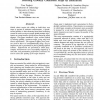Free Online Productivity Tools
i2Speak
i2Symbol
i2OCR
iTex2Img
iWeb2Print
iWeb2Shot
i2Type
iPdf2Split
iPdf2Merge
i2Bopomofo
i2Arabic
i2Style
i2Image
i2PDF
iLatex2Rtf
Sci2ools
103
click to vote
ICRA
2000
IEEE
2000
IEEE
Learning Globally Consistent Maps by Relaxation
Mobile robots require the ability to build their own maps to operate in unknown environments. A fundamental problem is that odometry-based dead reckoning cannot be used to assign accurate global position information to a map because of drift errors caused by wheel slippage. This paper introduces a fast, on-line method of learning globally consistent maps, using only local metric information. The approach differs from previous work in that it is computationally cheap, easy to implement and is guaranteed to find a globally optimal solution. Experiments are presented in which large, complex environments were successfully mapped by a real robot, and quantitative performance measures are used to assess the quality of the maps obtained.
Accurate Global Position | ICRA 2000 | Odometry-based Dead Reckoning | Robotics | Unknown Environments |
Related Content
| Added | 31 Jul 2010 |
| Updated | 31 Jul 2010 |
| Type | Conference |
| Year | 2000 |
| Where | ICRA |
| Authors | Tom Duckett, Stephen Marsland, Jonathan Shapiro |
Comments (0)

